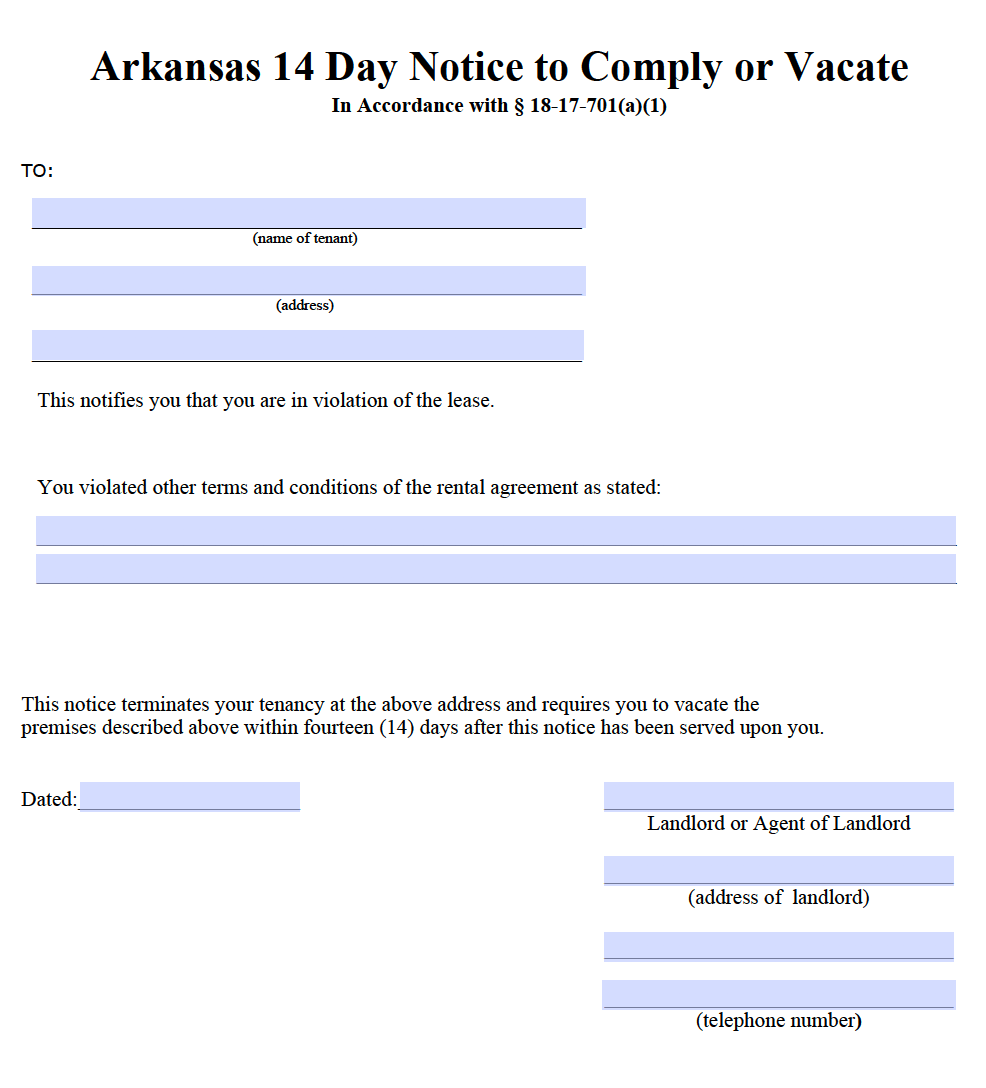How to Evict a Tenant (Process)
There are two (2) ways a landlord can file an eviction but which one that the landlord must file depends on the violation of the tenant.
1. Late Rent – If the tenant is late on rent, the landlord must file an unlawful detainer case.
2. Non-Compliance – If the tenant is violating the lease for anything other than rent the landlord must file a civil case.
Tenant’s Defense
Tenants should be aware that Arkansas has some of the toughest laws in the country in terms of their rights. If they choose to fight an unlawful detainer, not only do they need to submit a month’s rent to the court, but if the tenant should lose they can be charged with a class-b misdemeanor which has a maximum penalty $1,000 and/or serving up to 90 days in jail.
If the tenant pleads guilty to an unlawful detainer, the maximum fine they would face is a fine of up to $25 per day for every day they stay on the property after the 10th day.
How to File an Unlawful Detainer (Failure to Pay Rent)
The instructions below for Unlawful Detainer proceedings are pursuant to § 18-60-307.
Step 1 – Fill-in the 3-Day Notice to Pay or Quit
Complete the three (3) day notice to quit for the non-payment of rent.
Step 2 – Serve the Notice to the Tenant
The notice must be delivered to the tenant via a delivery method approved by the State of Arkansas (personal delivery or certified/registered mail). The tenant is considered to be notified at the time of mailing, and no receipt of delivery is needed. Once the lease/rental agreement has been terminated, the landlord can file an eviction action in an Arkansas District Court.
Step 3 – File the Unlawful Detainer
The landlord will be allowed to file an unlawful detainer ten (10) days after the expiration of the notice to quit (so thirteen (13) after the notice was issued).
The following forms will be required to be submitted to the court:
Complaint – Form may be obtained from the county court.
Affidavit Supporting Eviction – (this is a notarized document stating the landlord’s intention to evict the tenant from the premises and terminate their rental agreement)
Step 4 – Serve the Court Papers to Tenant
The landlord will have to serve the Complaint, Affidavit Supporting Eviction, and a Summons to the tenant (Find a Process Server) and the tenant will have five (5) business days to respond or to vacate the premises.
Notice of Intention of Issuing Writ of Possession – Depending on the county, this form may also have to be served on the Tenant.
After serving the tenant, the landlord will need to file any papers proving the tenant has been sent the eviction filing.
Tenant’s Defense – If the tenant decides to defend themselves they will have to make a deposit of 1-month’s rent to the court clerk’s office and file a form called the Answer. Afterwards, a court hearing date will be made where both, landlord and tenant, are expected to appear. If the tenant is found guilty after attempting to defend themselves, he or she could be found guilty of a class b misdemeanor which comes with a maximum penalty of $1,000 fine § 5-4-201(b)(2) and up to § 5-4-401(b)(2).
Step 5 – File Order for Immediate Possession
If the tenant does not choose to reply to the papers served on them, the landlord will be able to file an Order for Immediate Possession that is signed by the judge. Once signed, the Writ of Possession is able to be issued and validated by the clerk for a fee of $20.
Step 6 – Give Writ of Possession to Sheriff
The landlord will need to give the Writ of Possession to their local Sheriff’s office which will require the Sheriff to issue the tenant a statement saying the Writ has been issued against them and that they have twenty-four (24) hours to leave the premises.
If the tenant does not leave then the landlord has the legal authority to change the locks and do whatever it is necessary to regain possession of their property.
Arkansas Eviction Laws – § 18-60-301 to § 18-60-312





